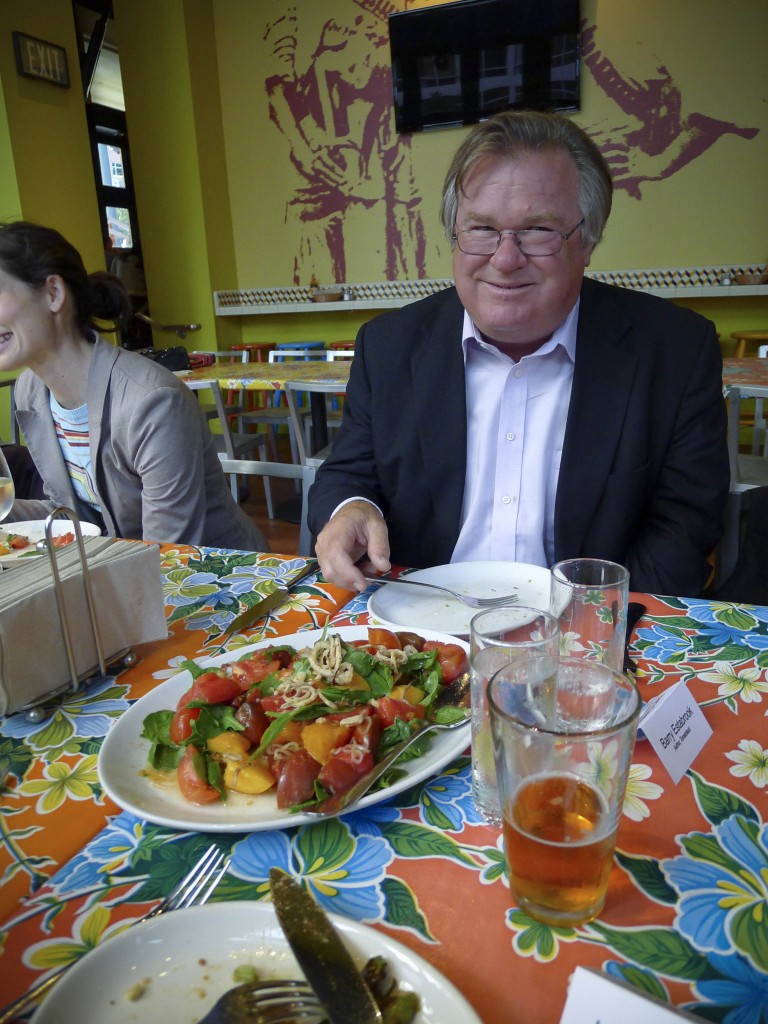Done “Unripe and Unfair” Dinner with Barry Estabrook
For the second dinner in our Eat With Bon Appétit series, we once again gathered at Mijita in San Francisco. This time, the guest of honor was Barry Estabrook, author of the new book Tomatoland: How Modern Industrial Agriculture Destroyed Our Most Alluring Fruit. The winner of a 2011 James Beard Award for his blog, Politics of the Plate, Barry has dug deep into the sterile, sandy soil of Florida’s tomato industry to reveal why most of the tomatoes Americans eat have no flavor and to illuminate the equally unsavory labor practices under which these rock-hard fruits are grown.
We saw the dinner with Barry as a way not only to introduce local journalists to Bon Appétit’s focus on farmworkers, but also get them excited about TEDxFruitvale, the farm-labor conference we were hosting a few months later, at which Barry would be a speaker. However, one has to be very careful about how one tries to deliver such a message, as journalists these days are swarmed by companies bragging about their sustainability initiatives. We decided to invite some of our friends in the nonprofit world working on this issue to join us. That would give the reporters other interesting people besides Barry with whom to chat, and with luck give us more credibility in their eyes.
On a Thursday evening in August, about 10 media representatives from Mother Jones, Grist, Bay Area Bites, Bay Citizen, Edible San Francisco, East Bay Express, and others sat down at one long table with 10 special guests from United Farm Workers, Pesticide Action Network, Oxfam America, Just Harvest, and the Association of Farmworker Opportunity Programs. We were joined by two local tomato farmers from Baia Nichaia, who supplied some of the evening’s delicious red, yellow and green fruits — the perfect counterpoint to the tomato travesties grown in Florida’s inhospitable sandy soil by historically mistreated workers.
Maisie began by welcoming everyone and asking them if they recalled Barry’s March 2009 article for Gourmet about Florida’s tomato pickers, which said, “If you have eaten a tomato this winter, chances are very good that it was picked by a person who lives in virtual slavery.” That article was part of what propelled Bon Appétit CEO Fedele Bauccio and Maisier to visit Immokalee, FL, and partner with the Coalition of Immokalee Workers (CIW) to coauthor a code of conduct for Bon Appétit’s Florida tomato growers. Barry’s article, she said, had had a huge impact on Bon Appétit chefs as well: they too were eager to avoid supporting such practices, even if that meant serving only responsibly grown grape tomatoes in the winter of 2009 to make a point.
When it was his turn, Barry picked up her story. “Back in 2009, Bon Appétit was the first! All the other food service companies had no choice but to come aboard,” he told the assembled guests. “They went from not acknowledging the CIW’s existence to sitting down with them to agreeing on what’s fair.”
Both Maisie and Barry had recently been back to Immokalee — where a large part of his book is set — to see the hard-won progress CIW has made in getting fair treatment for tomato pickers. “There’s been a sea change. For the first time, there’s hope,” Barry reported. “There’s a new invention in Tomatoland: a punch clock!” Tomato pickers are now being paid for the time spend working, not for how many 30-pound buckets they can fill as fast as possible at the expense of their own backs.
With that, the formal talks ended, and many small-group discussions bloomed amongst Barry, the journalists, and our friends at United Farm Workers and Pesticide Action Network, etc.
The delicious Mexican-inspired fare prepared by Mijita Chef/Manager Cristina Perez was the perfect accompaniment to the lively conversation. The tomato-centric family-style dishes included Padron peppers, charred cherry tomatoes and chicharrones (fried pork skin); pan con tomate (grilled bread with garlic and tomatoes); a revelatory Brandywine tomato and peach salad with basil and orange; fried green tomatoes with queso fresco and corn salsa; local halibut ceviche tostadas; tripe with black beans; and finished off with a sweet yet tart pineapple tomato and basil granite.
In addition to copies of Barry’s book, which the publisher had sent for us to give out, Cristina made little gift baskets of tomatoes for everyone to take home, which they loved! In addition to the goodies, they left with the knowledge that Bon Appétit is a pioneer in the area of farmworker justice — and we’re proud to note that almost everyone who came that night also later attended TEDxFruitvale.
